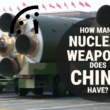How plutonium undermines the Hibakusha
By Mustafa Kibaroglu, August 26, 2015
Akira Kawasaki wrote in Round One that the noble disarmament efforts of the Hibakusha—survivors of the atomic bombings of Hiroshima and Nagasaki—"have often been ignored" outside Japan. Indeed, the Hibakusha's message has "sometimes been misinterpreted so badly" that it has "been portrayed as an incentive for nations to develop nuclear weapons in the name of deterrence."
That is a shame. Still, I can't help wondering if the world's failure to heed the Hibakusha's message may be attributable at least in part to Japan’s vast, growing stockpile of plutonium. I wonder if possession of so much fissile material dilutes the disarmament message that Japan—as the only nation to have suffered wartime detonations of nuclear weapons—is uniquely qualified to deliver.
Over the years Japan has accumulated about 47 metric tons of plutonium (separated from spent reactor fuel). Of the 47 tons, 36 are stored in the United Kingdom and France; 11 reside in Japan. This quantity of plutonium—enough to build thousands of nuclear weapons—considerably diminishes the international community's confidence that Japan will never attempt to develop nuclear weapons. And thus it undermines the sympathy that Japan deserves as the world's only direct victim of nuclear warfare.
Certain political tendencies in Japan exacerbate the problem. As Kawasaki wrote, "the doctrine of nuclear deterrence is challenged less and less" in Japan today, and "a handful of ideologues … advocate that Japan become nuclear-armed itself." Meanwhile, when disarmament advocates suggest that Japan follow Sweden's example by making non-nuclear status a permanent, unconditional feature of the country's foreign and security policy, Japanese officials reply that the country's Atomic Energy Basic Law already forbids military uses for nuclear technology. This does not inspire confidence within the international community that Japan will remain non-nuclear forever.
What to do. Japanese authorities should consider taking a series of tangible steps to provide the utmost assurances that under no circumstances will Japan ever go nuclear.
First and foremost, Japan's plutonium stocks must increase no further. This means scrapping plans for the Rokkasho plutonium reprocessing facility—which, after decades of delays and tens of billions of dollars in expenditures, is now scheduled to begin operating in 2016. Second, Japanese authorities should consider expanding their program for using plutonium-uranium mixed oxide fuel in power reactors. This could lead to reductions in plutonium stocks over time. If Japan separated no more plutonium and gradually used up the plutonium it already possesses, it would send a powerful nonproliferation message to the world—and perhaps strengthen international efforts to make the proposed Fissile Material Cutoff Treaty a reality.
I realize that taking Japan to task over its plutonium stocks could be perceived as an injustice when the Japanese government's nonproliferation record has been commendable over the decades. And I realize that Japan's leaders, understandably, worry about North Korea's nuclear arsenal. Thus it is only fair to suggest that, while Japan solves its plutonium problem, its friends and allies seek ways to strengthen solidarity with Tokyo and enhance the nation's security.
Topics: Nuclear Energy, Nuclear Weapons
Share: [addthis tool="addthis_inline_share_toolbox"]














